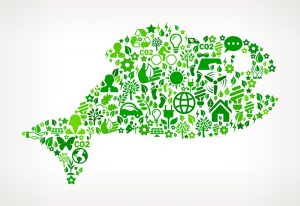 By Rick Crawford
By Rick Crawford
I’ve known many different companies with diverse worldviews, especially when it comes to talking about conservation vs. sustainability. Similarly, we tend to vote for candidates that represent a worldview reflective of our own. Since we all just exercised our right and privilege to vote, it’s interesting to note how different worldviews can in fact achieve the same end.
Here’s what I’ve learned:
While developing strategies that mitigate risks, enhance brand value, and increase profitability for my customers, I also get to understand how they feel on issues of conservation or sustainability, which is generally a good indicator of worldview. To be clear, these are only observations. But generally speaking, those who vote conservatively are more likely to believe in “conservation” and consider themselves “conservationists.” Those who vote more liberally, on the other hand, are more likely to believe in “sustainability” and consider themselves “environmental activists.” Of course, there are some who fall somewhere in the middle, too.
Some companies are uncomfortable discussing climate change, and many are convinced it’s a hoax. However, these same companies are often true conservationists when it comes to protecting and conserving the resources that are important to them. Other companies believe that climate change is an immediate, dangerous threat and want to limit their greenhouse gas emissions in order to lessen their impact on climate change. The interesting thing about these seemingly opposing worldviews is that companies in both groups want to achieve the same end, but to do so they tell themselves two different stories.
Whether you consider yourself a conservationist or an environmental activist, or you prefer the idea of conservation vs. sustainability, it really doesn’t matter because we all live on a planet with finite resources and can all agree that the world’s population is increasing. Moreover, running a responsible operation that conserves energy and water while minimizing the amount of waste produced is just good business. That’s because conserving resources will reduce operational costs and potentially create new revenue streams.
It just so happens that lessening a company’s environmental footprint will also decrease the amount of greenhouse gasses a business emits, therefore minimizing impact on climate change. So there really is no difference. Call it conserving resources, acting on climate change, or whatever—as anglers we all want to protect and conserve the resources that enable us to get outside and do what we love. Just because we want, and have a right to, clean water and air doesn’t make us all environmental activists, it makes us citizens with inherent rights.
Rick Crawford is a mediocre fly fisherman and the President of Emerger Strategies, a company providing fly fishing lifestyle brands, manufacturers and retailers with sustainability and marketing strategies that mitigate risks, enhance brand value and increase profitability. After graduating with an MBA in Sustainable Business from Marylhurst University, Crawford spent the last five years in the sustainability industry working with start-ups, small-to-medium enterprises and manufacturers in a variety of fields, including: solar, bio-diesel, green building and product transparency. Click here for more information.



